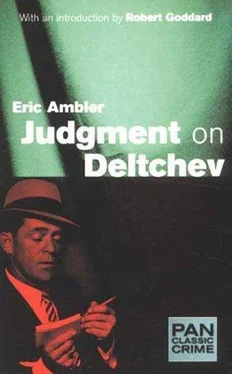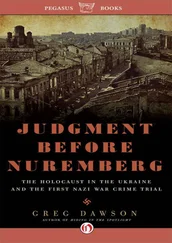Eric Ambler - Judgment on Deltchev
Здесь есть возможность читать онлайн «Eric Ambler - Judgment on Deltchev» весь текст электронной книги совершенно бесплатно (целиком полную версию без сокращений). В некоторых случаях можно слушать аудио, скачать через торрент в формате fb2 и присутствует краткое содержание. Год выпуска: 1977, ISBN: 1977, Издательство: Vintage, Жанр: Криминальный детектив, на английском языке. Описание произведения, (предисловие) а так же отзывы посетителей доступны на портале библиотеки ЛибКат.
- Название:Judgment on Deltchev
- Автор:
- Издательство:Vintage
- Жанр:
- Год:1977
- ISBN:9780307049971
- Рейтинг книги:4 / 5. Голосов: 1
-
Избранное:Добавить в избранное
- Отзывы:
-
Ваша оценка:
- 80
- 1
- 2
- 3
- 4
- 5
Judgment on Deltchev: краткое содержание, описание и аннотация
Предлагаем к чтению аннотацию, описание, краткое содержание или предисловие (зависит от того, что написал сам автор книги «Judgment on Deltchev»). Если вы не нашли необходимую информацию о книге — напишите в комментариях, мы постараемся отыскать её.
Judgment on Deltchev — читать онлайн бесплатно полную книгу (весь текст) целиком
Ниже представлен текст книги, разбитый по страницам. Система сохранения места последней прочитанной страницы, позволяет с удобством читать онлайн бесплатно книгу «Judgment on Deltchev», без необходимости каждый раз заново искать на чём Вы остановились. Поставьте закладку, и сможете в любой момент перейти на страницу, на которой закончили чтение.
Интервал:
Закладка:
‘I’ll tell him. There’s one thing I should like to know.’
‘Yes?’
‘What induced your husband to make that election speech? What had gone wrong?’
‘Nothing that would make a newspaper story, Herr Foster.’
‘It is for my own information that I ask.’
She shrugged. ‘As you please. It is no longer important, I suppose, what sort of man my husband was.’
When she had told me, I left.
I did not go back to the hotel. I reached the station with half an hour to spare. My passport got me on the train. The delay was at the frontier. It took me thirty-six hours to get to Athens, and by that time the Vukashin account of the Brankovitch assassination was out. The assassin was a man named Alexander Gatin and he, together with an accomplice named Pashik, had been shot and killed while resisting arrest.
Philip Deltchev was a pompous but amiable young man and very grateful for his mother’s message. He said that it made him feel much better about everything. He was quite sure that she would contrive to join him. He did not mention his father.
CHAPTER TWENTY-ONE
I saw the end of the Deltchev trial in the projection room of a newsreel company in London.
In the hard blacks and whites of the Propaganda Ministry’s cameramen the scene looked more real than the one I remembered. Perhaps the film gave it an authority the original had lacked. Or it may have been the sound track that produced the effect; there was no interpreter to divide one’s attention. With the six reels of film that Brankovitch’s successor had selected for foreign consumption a translation of the proceedings had been sent; but for the moment I wanted just to look at it, and to look at Deltchev.
There was not a great deal of footage that included him. Only one of the three cameras had covered the dock, and the film had been received in an edited form which favoured the judges and Dr Prochaska; but during one evident denunciation of the prisoner there was a shot that showed him frowning anxiously and shifting his position in a way that made him look guilty. Most likely, the shot had some other true explanation — boredom or some physical discomfort — but for me, as for the Propaganda Ministry, it had another significance. The Propaganda Ministry saw a scheming villain brought to book. I saw a pre-war Minister of Posts and Telegraphs struggling to be a statesman. But then, I had listened to his wife.
It was the word ‘Papa’ that defeated him.
The first time Deltchev saw the word printed in front of his name it pleased him; for, knowing his countrymen, he recognized the note of wry affection in it. It meant that they trusted him and that, although they might grumble, they would accept hardship at his hands and would not hate him too intensely. With amused pride he showed the newspaper to his wife and son. The small pang of anxiety he experienced he found unaccountable and ignored.
The nickname soon gained currency, and its use was no longer an occasion for comment; but he did not, for some reason, get used to it. On the contrary; as time went by, he began to experience discomfort whenever he saw it or heard it used. It had begun to feel to him like an accusation.
‘Yordan always invites criticism,’ his wife had said, ‘and always fears it.’
Deltchev was aware of the jokes about his motives and had hitherto thought himself a better and not more prejudiced judge of them. Shrewd he might be; yet in 1940 he had opposed the Nazis, not for any personal advantage — unless internment and oblivion were advantages — but because he had thought it right to do so. Ambitious he might be; yet he had organized the Committee of National Unity, not for the risk of dying a martyr’s death at the hands of the Gestapo, but because he thought it right to do so. But now, with his power increasing daily and that word ‘Papa’ fastened to his name, he was no longer sure of himself. The whole climate of his thought and feeling seemed to be changing. If he were held in affection, trusted, he must be worthy. His conscience told him that he was not.
‘Yordan is a self-torturer,’ his wife had said.
A terrible conflict now began within him; and the battleground chosen was the question of the election promise.
Reason and experience told him that the Provisional Government was the best that could be devised for the country in the present situation and that elections might well mean the accession of the People’s Party to power. He believed that would be a disaster for the country. Reasoning, a lawyer’s reasoning, told him, too, that the promise had been one of free elections and that the essential condition of freedom was not at present obtainable.
Yet the other voice, the cruel, accusing, contemptuous, punishing voice that haunted him, offered arguments, of a different kind. ‘Why are you so anxious?’ it enquired. ‘Why do you hesitate? Is it because you know in your heart that you have become corrupt and that these reasons you invent for keeping the power in your hands are mere devices to conceal the fact? Is it? You dictators are all the same! You whine that what you do is for the people’s good and that they love and trust you. But when there is a chance that you may have to put that love and trust to the test, you find reasons — oh, excellent reasons! — why you should not do so. And the reasons are always to the same tune. It is for the people’s good, you cry. That, my friend, is the spiral of corruption you are ascending. Government by consent of the governed! You know the phrase? Who are you to determine what government they shall consent to? Your power and their trust in you give you a responsibility above your party interests. You see now the distinction between a statesman and a politician. The statesman has courage. Did you speak? Ah no! not the courage of his convictions. (How you twist and turn, my friend, to avoid the truth!) The statesman has the courage to be impartial — even at the risk of his own destruction.’
He told no one until after it was over, and then he told his wife.
‘My hands are clean,’ he said. It was as though by violating all his own beliefs and interests, as well as those of other honest men, he had performed an act of absolution for some unnameable sin.
‘Last reel,’ said the cutter who was supervising the running. ‘Judges’ summing up and sentence.’
I looked at the screen again. I looked at the tired shell of a man who had been Yordan Deltchev and at the Presiding Judge delivering the sentence of death by hanging, which had since been carried out.
There was silence in the courtroom after the sentence. Probably the spectators were expecting him to say something. But there was nothing. He nodded his head slightly and turned to go. The guards stepped forward. Then he climbed down from the dock and walked slowly away between them.
I recalled another departure he had made from the courtroom and the parallel I had attempted to draw from the trial of Socrates. My memory of it was better now. There were words more apt than the others I had chosen.
‘ But, sirs, it may be that the difficulty is not to flee from death, but from guilt. Guilt is swifter than death .’
‘That’s the lot,’ said the cutter. ‘Would you like to see the assassination of Brankovitch? I’ve got it here.’
‘No, thanks,’ I said. ‘I’ve seen it.’
Интервал:
Закладка:
Похожие книги на «Judgment on Deltchev»
Представляем Вашему вниманию похожие книги на «Judgment on Deltchev» списком для выбора. Мы отобрали схожую по названию и смыслу литературу в надежде предоставить читателям больше вариантов отыскать новые, интересные, ещё непрочитанные произведения.
Обсуждение, отзывы о книге «Judgment on Deltchev» и просто собственные мнения читателей. Оставьте ваши комментарии, напишите, что Вы думаете о произведении, его смысле или главных героях. Укажите что конкретно понравилось, а что нет, и почему Вы так считаете.












